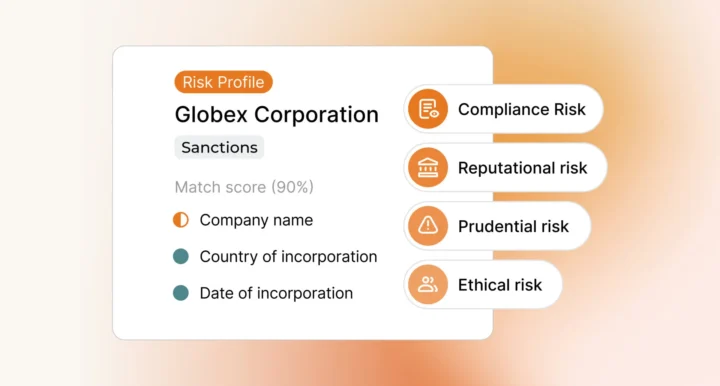Sweden is a prosperous Nordic country and EU member-state with a highly developed economy. While it is traditionally regarded as a safe financial destination, recent criminal scandals have damaged Sweden’s reputation. In 2019, for example, an investigation into the Swedish bank Swedbank exposed a $200 million money laundering scheme in its Eastern European and Russian branches, and led to a €360 million fine. Similarly, in 2022, investigators uncovered money laundering regulatory violations at Swedish gambling companies Kindred, ATG, and Pinbet – and subsequently issued millions of Euros in fines to each company.
To combat the threat of financial crime, and protect the integrity of its financial system, Sweden is tightening its anti-money laundering (AML) and counter-financing of terrorism (CFT) controls, and pushing for a more robust regulatory framework across the EU. Given the increased focus, firms must understand their AML/CFT obligations in Sweden, and how to achieve regulatory compliance.
Sweden’s AML Regulator: Finansinspektionen
Established in 1991 as a merger of the Bank Inspectorate and the Insurance Supervision Authority, the Financial Supervisory Authority of Sweden, or Finansinspektionen (FI), is the country’s primary financial regulator.
FI operates under the authority of the Swedish Ministry of Finance and is responsible for examining the “risks and control systems” of the country’s financial institutions and supervising “compliance with statutes, ordinances and other regulations.” Those duties mean that FI is responsible for assessing the effectiveness of Sweden’s AML/CFT legislation and, where necessary, making recommendations for amendments. In its supervisory role, the regulator also assesses the financial health of companies setting up in Sweden, and issues permits to those deemed competent to conduct business.
In addition, FI has a mandate for financial education, disclosing clear and accurate financial information to the Swedish public and issuing guidance on compliance regulations to public and private entities. As Sweden’s national financial regulator, FI works with counterparts in other countries to aid AML/CFT investigations and address global criminal threats.
Key Sweden AML Regulations
Sweden’s main article of AML/CFT legislation is the Money Laundering and Terrorist Financing (Prevention) Act, also known as the Anti-Money Laundering Act, which requires firms to implement a risk-based AML/CFT compliance programme. In practice, this means that firms must assess the risk that individual customers present, and then deploy proportionate compliance measures. The AML Act also requires firms to monitor customers and their transactions for suspicious activity, and report AML alerts to Sweden’s Financial Intelligence Unit (FIU).
EU AMLDs: As a member of the EU, Sweden implements the Anti-Money Laundering Directives (AMLD), which are released periodically by the European Parliament and transposed into domestic legal frameworks. The latest AMLD is the Sixth Anti-Money Laundering Directive (6AMLD), which came into effect on 3 June 2021. Key regulatory details of 6AMLD include a harmonised list of money laundering predicate offences, an increase in the minimum penalties for money laundering, and an expanded definition of the crime of money laundering to include aiding and abetting.
AML/CFT penalties: In 2020, the penalty for money laundering in Sweden was capped at €50 million. Individuals found guilty of money laundering may face prison sentences of between 6 months and 6 years.
How to Comply With Sweden’s AML Regulations
In order to comply with Sweden’s risk-based AML/CFT regulations, firms must implement the following measures:
- Customer due diligence: Firms must conduct customer due diligence (CDD) in order to identify their customers and build accurate risk profiles. The CDD process includes the collection of names, addresses, dates of birth, and other identifying information, and should also include the ultimate beneficial ownership (UBO) of customer-entities.
- Transaction screening: Firms must screen their customers’ transactions on an ongoing basis for signs of money laundering activity. This might include transactions involving high risk counterparties or high risk jurisdictions.
- Sanctions and watchlist screening: As part of the screening process, firms must ensure they are not doing business with sanctions targets and politically exposed persons (PEP). To identify this type of high risk customer, firms must screen against international sanctions lists, PEP lists, and other relevant financial crime watchlists.
Adverse media screening: One of the most effective ways to strengthen compliance with risk-based screening requirements is to screen customers for involvement in adverse or negative news media. News reports and other forms of online media often reveal information about customers before it is officially confirmed – enabling firms to react as quickly as possible when a customer’s risk profile changes.
The EU AMLDs require firms to implement adverse media screening as part of their AML/CFT compliance process. This means that firms must integrate software capable of screening for adverse media on a global scale, with a coverage that includes traditional print and screen outlets, websites, and other data sources such as blogs, forums, and social media platforms.
Recent AML Initiatives in Sweden
The Swedish government is pushing for the EU to implement its most recent AML/CFT proposals, and is keen to advance the introduction of a single AML/CFT Rulebook, and a centralised Anti-Money Laundering Authority (AMLA). Discussions around both initiatives have gained broad consensus from EU member states but the location of the new AMLA is yet to be decided.
Sweden will also implement the EU’s Markets in Crypto-Assets (MiCA) regulation, a landmark new framework for managing the risks posed by unbacked crypto-assets and stablecoins. MiCA will come into effect in 2024, and joins the Transfer of Funds Regulation (TFR) which extends AML/CFT reporting and record-keeping obligations to cryptocurrency service providers.
Next Generation AML Screening for Swedish Compliance
Sweden’s AML/CFT landscape is changing, and financial institutions need to be able to respond quickly to new risks and regulatory requirements, and emerging criminal threats.
In this environment, Ripjar’s Labyrinth Screening platform provides a powerful compliance advantage, enabling searches of thousands of structured and unstructured data sources, including foreign news stories, sanctions lists, and watchlists, and generating real time financial intelligence. Built with next generation machine learning technology, Labyrinth enables firms to extract the most relevant compliance data from a source in seconds, so that firms can react quickly to new threats, in Sweden and beyond, and know as soon as possible when a client’s risk profile changes.
Contact us to discuss how Ripjar can support your AML compliance in Sweden
Last updated: 31 January 2025





